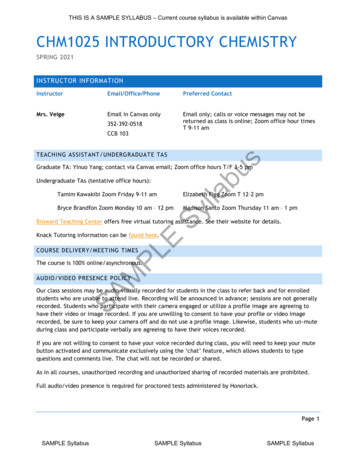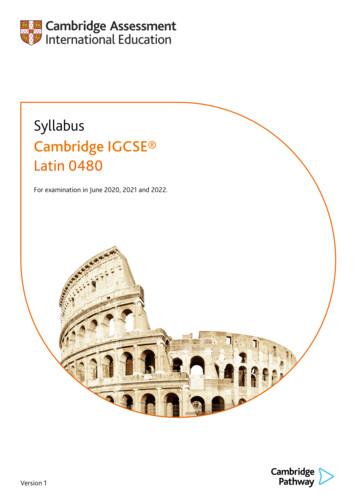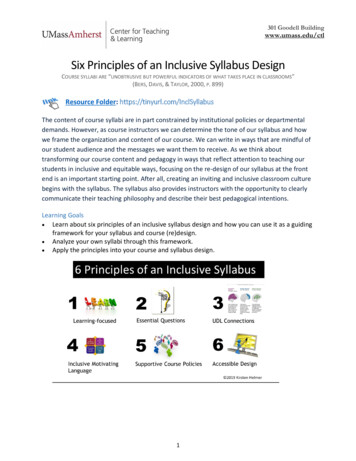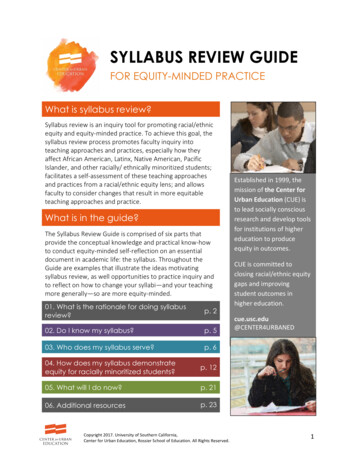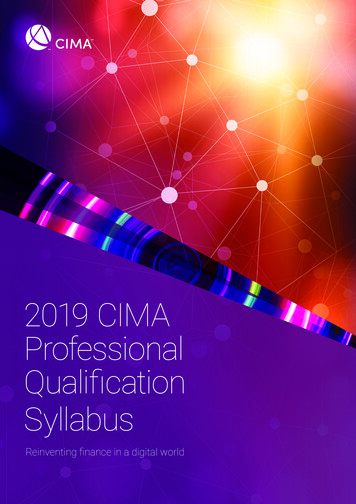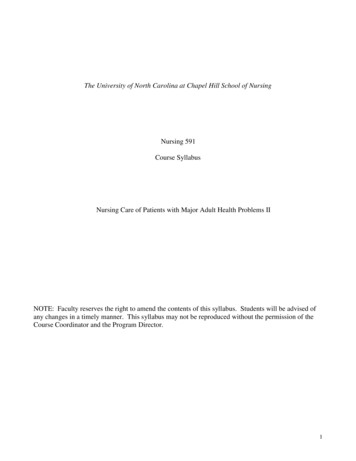
Transcription
Operations Management (C11OE)SyllabusAIMThe Operations Management course aims to provide students with a critical understanding of the scopeand strategic importance of operations management and the role of operations managers; and anappreciation of the interaction of operations with the organisation, employees and customers. You will gaina critical understanding of the nature and importance of operations management, not only in your own butin other organisations competing in the global environment.SYNOPSISIn this course, you will be studying how operations deliver goods and services. Essentially the courseconcentrates on how operations are designed, how they are directed, controlled and improved byoperations managers. The core activity of any organisation is its operations. This course takes a detailedlook at the decisions managers need to make about operations, the concepts and the performanceobjectives that underpin these decisions, and the impact that they have. The course provides conceptual,analytical and practical insights into the effective management of operations in all organisations.The course enables you to critically evaluate key concepts and principles of operations management andalso the contribution of strategy. When we look at product design, we will look at service design andimprovement initiatives. You will be able to critically assess these as part of your learning outcomes andcritically understand operations management techniques through tasks, discussion and examination. Youalso will be able to understand the scope of interorganisational cooperation and consider the notion oftrade-offs in terms of operations performance objectives. You will look at quality management frameworksand distinguish the differences between them.LEARNING OUTCOMESOn completion of this course students will be able to: understand the linkages between process and operations design, business strategy andglobalisation.Syllabus1
understand the different elements of operations and how to analyse an operational environment interms of these elements. appreciate the tools and techniques applicable in the context of operations in global dynamicorganisations. understand the challenges facing the operations manager to exploit innovative practices (e.g. lean,new technologies and the growing social agendas, such as CSR).SUPPORTING TEXTBOOKSlack, N., Brandon-Jones, A. (2018) Essentials of Operations Management, 2nd Edition, London, Pearson.COURSE STRUCTUREThe course is broken down into 8 learning modules as follows.Module 1: Understanding operations management and strategyThis module is a larger unit as it introduces you to key concepts and terminology to support your studies ofoperations management.At the end of this module, you will: be able to define operations management and underpinning concepts; be familiar with operations terminology; understand the concept of the 4Vs; be able to apply the five operations objectives internally and externally; and understand the contribution made by operations to organisational performance.Topics covered are as follows. The concept of operations management The input-process-output model Operations strategy and contribution The five performance objectives The 4Vs and their influence on process managementSyllabus2
Module 2: Process design, type, layout and mappingIn this module, you will study how operational processes are designed. You will see how the overall layoutof transforming resources impacts on the flow of transformed resources as they move through theoperation. You’ll discover the various types of process and the different ways to arrange resources withinthose processes. You will also look at how people’s job design and the use of technology can improve theeffectiveness of processes. You’ll examine activities within processes and look at how they can be analysedto improve performance.At the end of this module, you will be able to: recognise the importance of process design in operations management; differentiate between the different types of processes and the impact of volume/varietydimensions; identify common process layouts and evaluate when they can be used and the associatedchallenges; evaluate if process tasks and capacity are configured appropriately and if process variabilityrecognised; apply process mapping.Topics covered are as follows. Process design Processes and volume/variety dimensions Manufacturing and service process types Process layouts Job design Process mappingModule 3: Product and service innovationThe aim of this module is to help you understand how operations managers are increasingly expected to takea more active role in the design of processes as well as supporting the design of products and services andbringing them to life through the operations capabilities. You’ll discover, through your study of this module,that innovation is about generating new ideas.Syllabus3
At the end of this module, you will be able to: understand the issues involved in defining product and service innovation; recognise the different types of innovation; understand the nature and extent of innovation; and critically assess and explain key current issues in our understanding of innovation.Topics covered are as follows. Definitions and types of innovation Innovation as a process Beyond product and service innovation The significance of product and process innovation and service innovationModule 4: Capacity and demand managementThe aim of this module is to enable you to recognise the reasons for the existence of operations management,which is to produce products and services that the marketplace wants. There are, however, limitations withinoperations as to how these can be supplied. One of these limits is processing capacity: what can theorganisation provide in any given period? This is usually expressed in the units of time or volume. Theoperations function has to balance demand with its ability to supply in a timely manner. In this module you’llgain an appreciation of what is involved in capacity management.At the end of this module, you will: be able to critically appreciate the importance of capacity management; be able to recognise short-, medium- and long-term capacity management; be able to critically evaluate strategies for coping with demand and capacity mismatches; and understand volume implications of capacity managementTopics covered are as follows. The objectives of capacity management Medium- and long-term capacity management Reconciling capacity and demand Short- and long-term outlooks affecting volumeSyllabus4
Module 5: Inventory managementThe aim of this module is to explore what inventory is, why it is needed and how to control it. You’ll covertwo key decisions: the volume decision (how much to order) and the timing decision (when to order).At the end of this module, you will be able to: recognise the importance of inventory and inventory management; understand how organisations monitor inventory performance; select and apply appropriate inventory control models to improve inventory performance; understand strategies for managing stock replenishment; and critically evaluate strategies for inventory control.Topics covered are as follows. Inventory control Understanding the impact of order quantity on inventory turns The periodic review approach Cycle safety stocksModule 6: Quality methodologiesThe aim of this module is to focus on quality management and improvement philosophies. The improvementphilosophies covered link to the idea of ‘continuous improvement’ in so far as operations performance ‘willalways benefit from continuous improvement (Slack and Brandon-Jones, 2018: 347). Lean is recognisedas an improvement philosophy with its origins in Toyota. Researchers coined the term ‘lean’ as part of aglobal study on the automotive industry. This study focused not only on operational capabilities but alsothose across the supply network. The concept of quality management, through a focus on operationsimprovement, will be discussed in this module.At the end of this module, you will be able to: recognise the role of quality in operations management; apply the gap model to your own organisation; critically evaluate quality costs and their impact on an organisation; understand quality methodologies; clearly define lean and its underpinning concepts; explain what is meant by muda, mura and muri;Syllabus5
recognise the role of people in lean (‘involvement of everyone’); and appreciate the role of lean tools in eliminating waste.Topics covered are as follows. The importance of quality The gap model and expectation-perception gaps Total Quality Management (TQM) and quality costs Six Sigma Lean Causes of waste: muda, mura and muri Involvement of everyone for successful improvement Lean tools Lean improvements across different sectorsModule 7: Sustainable operationsThe aim of this module is to consider sustainability from an operations management perspective. Thatencompasses the design, inputs and outputs of a process and how resources are consumed. The increasingfocus on sustainability means that operations managers have to include this into the design and managementof operations more widely. Legislation may be driving this, with clear targets to meet, but operations mayalso extend consideration of this on a more voluntary basis.At the end of this module, you will be able to: evaluate the impact of the triple bottom line (TBL); recognise the role of operations in supporting sustainability; understand the role of process design in supporting sustainable operations; and critically evaluate sustainability practices.Topics covered are as follows The triple bottom line (TBL) The 3Ps in operations management Process design for environmental sustainability Sustainability at FinisterreSyllabus6
Module 8: Technology in operations managementThe aim of this module is to examine the technologies used to support the management and control ofoperations. Technology in operations has evolved due to the need for planning, monitoring and controllingthe operation. The use of technology provides visibility in how materials are being used and ifproducts/services are being produced as expected, allowing managers to have control over their processes.We can chart the growing application of technology from the developmentof material requirements planning (MRP) in the 1970s, which supported the planning and control ofmaterials and production activities, through enterprise resource planning (ERP) in the 1990s. In the 2000s,technology developed into cloud-based applications. Today, with Wi-Fi enabled systems, the technologyevident in operations includes automated systems that are sensor-controlled by Wi-Fi and robotics, whichare considered to be part of Industry 4.0, also known as the Fourth Industrial Revolution. This module willalso discuss how Industry 4.0 is expected to support or even transform the management of operations.At the end of this module, you will be able to: recognise the role of technology in operations; understand the role of enterprise resource planning (ERP) systems; critically appreciate new technologies and their expected roles in operations; and critically evaluate challenges in technology adoption.Topics covered are as follows Technology in operations management ERP systems Industry 4.0 in operations Challenges in technology adoptionASSESSMENTThe assessment for this course is a three-hour exam, which will bring all your learning from the coursetogether. The exam is geared towards you showing how you can apply the theories, concepts, and themodels that we've discussed in this course. What we really want you to show is that you can interpret whathappens in the real world and that you can make sense of it. You will be provided with plenty of supportand guidance to help you before the examination. The examination assessment enables you toSyllabus7
demonstrate what you have learnt from this course. You will draw upon examples to show what happens ina real organisation and how things work in a real-life situation.During the examination, you will be required to choose any three questions from the four questionsavailable. Each question will carry equal marks and will be marked out of 100. Your overall mark will becalculated by taking an average of the three marks awarded on your paper.Each question should be answered in no more than 1,500 words, so 4,500 words for your full examsubmission.Syllabus8
Module 1: Understanding operations management and strategy This module is a larger unit as it introduces you to key concepts and terminology to support your studies of operations management. At the end of this module, you will: be able to define operations management and underpinning concepts; be familiar with operations terminology;


